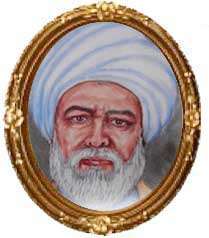Ibrahim al-Bajuri
Ibrāhīm ibn Muhammad ibn Ahmad al-Bājūrī (Arabic: إبراهيم بن محمد بن أحمد الشافعي الباجوري) was one of the foremost Shafi'i scholars and theologians of his time, authoring over 20 works and commentaries in Sacred Law, tenets of faith, Islamic estate division, scholastic theology, logic and Arabic.[3]
Ibrahim ibn Muhammad Bajuri | |
|---|---|
 | |
| Personal | |
| Born | AH 1198 (1783 CE)[1] |
| Died | AH 1276 (1860 CE)[1] |
| Religion | Islam |
| Ethnicity | Arab |
| Denomination | Sunni |
| Jurisprudence | Shafi'i[2] |
| Creed | Ash'ari[2] |
| Main interest(s) | Islamic theology, Hadith, Islamic jurisprudence |
| Muslim leader | |
Influenced by
| |
Birth and Education
al-Bajuri was born in the village of El Bagour, Monufia Governorate of Egypt.[1] He was raised and educated initially by his father, studying the Qur'an and its recitation.[4] At the age of 14 al-Bajuri entered al-Azhar in order to study the traditional sciences of Islam.[4] In 1798, al-Bajuri left al-Azhar due to the invasion of the French, and went to Giza where he remained until 1801; he then returned to al-Azhar to complete his education. Here, he excelled in his studies and began to teach and write on a variety of topics.[4]
Rector of al-Azhar
al-Bajuri taught at al-Azhar, and in 1847 became its rector,[5] a position he held until the end of his life.[1][4] During his tenure as Shaykh al-Azhar he spent much of his time teaching. His students included both young students aspiring to scholarship and also many of the great scholars of al-Azhar.[6]
Works
The most popular works in al-Bajuri's extensive literary production are:[1]
- Risala fi i'lm al-Tawhid
- al-Mawahib al-Laduniyya, a commentary on the Kitab al-Shama'il of al-Tirmidhi
- a commentary on the Burda of al-Busiri
- a commentary on the Takhrib or Mukhtasar of Abu Shuja (Matn Abi Shuja) [7]
- a commentary on the Akida al-Sughra of al-Sanusi
- a gloss on a commentary on the Jawharat al-Tawhid of Ibrahim ibn Ibrahim al-Lakani
- a gloss on al-Akhdari's commentary on his own al-Sullam al-Murawnak
- a commentary on the Kifayat al-Awamm of his teacher al-Fadali
- a commentary on the Mawlid of al-Dardir
- a commentary on a versification of the Ajārūmīya of Ibn Adjurrum.
Death
al-Bajuri died in 1276/1860.[1]
References
- Gibb, H. A. R.; Kramers, J. H.; Lévi-Provençal, E.; Schacht, J.; Lewis, B. & Pellat, Ch., eds. (1960). The Encyclopaedia of Islam, New Edition, Volume I: A–B. Leiden: E. J. Brill. p. 867. OCLC 495469456.
- Spevack, Aaron (1 Oct 2014). The Archetypal Sunni Scholar: Law, Theology, and Mysticism in the Synthesis of Al-Bajuri. State University of New York Press. p. 1. ISBN 143845371X.
- Keller, Nuh Ha Mim (1997). Reliance of the Traveller. A classic manual of Islamic Sacred Law. Beltsville, Maryland: Amana Publications. p. 1041. ISBN 0915957728.
- Spevack, Aaron (1 Oct 2014). The Archetypal Sunni Scholar: Law, Theology, and Mysticism in the Synthesis of Al-Bajuri. State University of New York Press. p. 7. ISBN 143845371X.
- Holmes Katz, Marion (2007). The Birth of The Prophet Muhammad: Devotional Piety in Sunni Islam. Routledge. p. 169. ISBN 0415771277.
- Spevack, Aaron (1 Oct 2014). The Archetypal Sunni Scholar: Law, Theology, and Mysticism in the Synthesis of Al-Bajuri. State University of New York Press. p. 8. ISBN 143845371X.
- Vrolijk, Arnoud; Hogendijk, Jan (2007). O ye Gentlemen: Arabic Studies on Science and Literary Culture: In Honour of Remke Kruk. BRILL Publishers. p. 476. ISBN 9047422058.